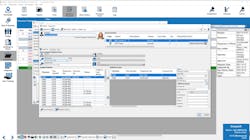Software For Today’s Locksmith
I started my locksmith career in 1977, the dark ages to some. At that time, locksmithing was old school, rooted deeply in an analog world — not so anymore — and just as computing has moved into security, so it also has in lockshops.
The modern era of personal computing was born in the 1970s and 1980s. I remember DOS code programs for locksmiths on floppy disks that were created by a company called Treskat. They had programs that had names such as Code Master, Auto Master, Kard Kat, Key Wiz and Key Manager.
In addition, we still used binder volumes of the yellow Reed’s codes and Curtis code books while clipping keys on No. 14 and 15 Curtis Clippers. These programs remain in use today. What does that tell you about our industry being slow adopters?
Mavericks of the industry started to condense millions of codes into easy-to-use digital formats. Companies such as Framon and HPC were great visionaries. I remember seeing the developer of the Framon code machine throw the machine on the showroom floor to show how durable his machine was — in addition to its intelligence. HPC developed the 1200 code machine that became the standard for many years and still is used today.
That was then. Now, Framon offers Genericode 22, the 22nd version of its key-computing software. HPC offers a code named Masterking.
And there are more software choices than ever before. Most companies offer their products as a one-time purchase or as a subscription, where you pay an annual fee and access cloud-based computing.
Most companies that offer software to locksmiths consist of car codes by make, model and year. Fill-in codes now help locksmiths to generate missing cuts for ignitions from the car doors code and master-key generation, which is a perfect subject for digital computing. The master-key programs not only generate key systems, but they also serve as databases to store vital bitting history. Of course, many security pros also make daily use of Microsoft Excel. What would we do without spreadsheets to store and format data?
Institutionally Speaking
Locksmiths now specialize in automotive, residential, safes — or they perform all of the above. In each case, there’s specialized software to meet the demands of the job.
I’m an institutional locksmith, and the software requirements for institutional locksmiths are immense. We have to have a lot of room for data. Here’s a partial rundown of what I have to keep track of as an institutional shop manager:
- The capability to load multiple types of brand and door hardware into a database
- The capability to import data from spreadsheets
- Must contain imported key plans with the capability of storing pictures for historical documentation
- Must maintain documentation as an asset management resource database
- Must provide key-control information to staff and local key managers
- Inclusion of a keyholder end-user database for key issuance
- The capability to maintain credentials in a photo-formatted ID system.
- Must maintain a record of returned and lost keys
- Maintain records for fire-door inspections
This is in addition to requirements that are universal: Any software I purchase must have a great track record, above-average customer service and a good reputation, while being expandable and easy to use.
I’m responsible for more than 400 buildings. Different buildings have different requirements based on size and quantity. I want to make major changes in the way we collect and maintain data.
My current data collection system is in dire need of replacing. Three systems are used and have been used for the past 14 years. The combination of more than 60 notebooks and two separate databases is quirky at best. The systems are stretched to capacity and constantly crash.
My predecessor was an amateur code writer who used Ruby on Rails to create our main database. Our IT folks are at their wit’s end. My fear had been that one day the database will crash beyond repair, and we won’t be able to maintain and issue keys.
In the end, I came up with two solutions. The first is SimpleK. SimpleK, now owned by ASSA ABLOY, seems to have the qualities that would meet and exceed the expectations of most institutional locksmiths, including me.
It’s expandable and scalable. I can manage system expansion and all rekeying. I can manage key requests, issuance and returns. It even will help with any master-key system design. Go to www.simplek.com for more information.
I also would like to recommend Instacode to institutional locksmiths. This is a powerful database that includes all kinds of codes, including file cabinet, desks, toolbox and coded cam locks.
Specialized locksmith software only will continue to be more of a vital tool for the modern locksmith. The ability to make keys by code is a time-saving moneymaker. Databases and spreadsheets have become invaluable depositories of information that we can’t live without.
Whatever the future is for locksmith software, the only thing that’s certain is we’ll have to have it.
Steve Fryman, CRL, CAI, CISM, AFDI, is the key compliance manager at Florida State University. He can be reached at [email protected].
About the Author
Steve Fryman, CRL, CAI, CISM, AFDI
Steve Fryman, CRL, CAI, CISM, AFDI, is the key compliance manager at Florida State University. He can be emailed at [email protected].
